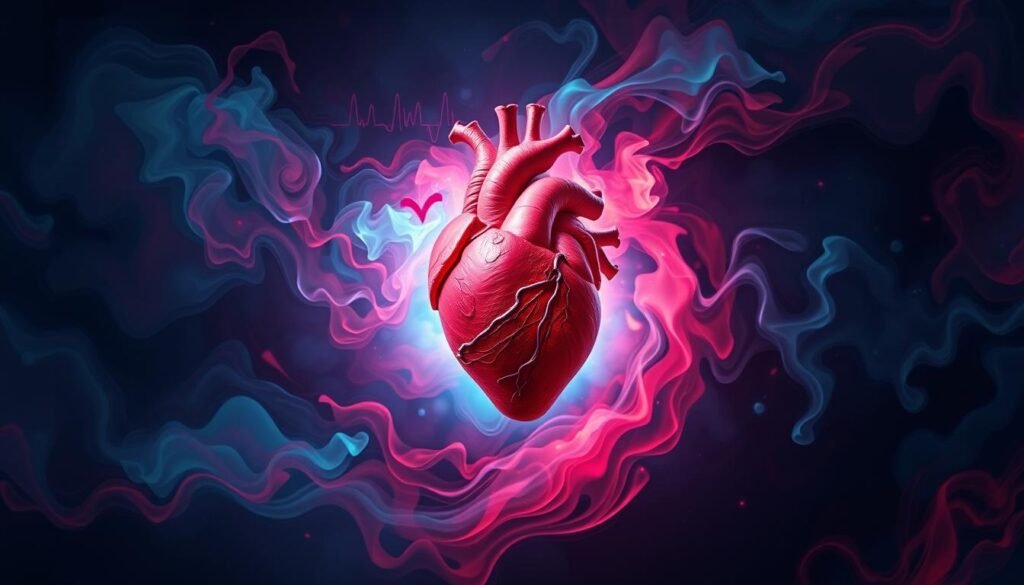About one in five adults in the U.S. will face anxiety disorders. That’s around seven million people dealing with anxiety at once. Anxiety palpitations can make your heart feel like it’s racing or fluttering. This often happens in stressful situations, such as public speaking or job interviews. Although they may worry you, these symptoms are usually not dangerous and don’t last long. Knowing the signs and how to calm these feelings is important for managing them.
Key Takeaways
- Heart palpitations from anxiety are frequently not related to heart issues.
- Recognizing triggers can help prevent anxiety palpitations.
- Non-medical strategies like mindfulness and breathing exercises are effective for relief.
- Various medications can be used to treat anxiety, requiring caution in their use.
- Stressful situations often increase the likelihood of experiencing panic attacks palpitations.
Understanding Anxiety Palpitations
Anxiety palpitations are noticeable and can feel like your heart is fluttering or pounding. People find this feeling unsettling. They may feel their heart beat quickly, miss a beat, or feel uneasy all the time. Knowing how anxiety and heart rate link is key to handle these symptoms.
Definition and Symptoms
With anxiety, one might notice their heart racing. This issue affects 19.1% of adults in the US, marking it as a top mental health issue. While the symptoms can vary, those with panic disorders often experience palpitations. These can come with other symptoms like heavy breathing, sweating, and feeling very tired.
Connection Between Anxiety and Heart Rate
Stress activates the autonomic nervous system, affecting our heart rate. When anxiety spikes, so does the heart rate, causing palpitations. Lifestyle, fever, and hormonal shifts can also make the heart flutter. Many with anxiety start feeling these symptoms before they turn 21, but some get them later in life.
| Symptoms of Anxiety Palpitations | Possible Causes |
|---|---|
| Rapid heartbeat | Stress, anxiety, caffeine |
| Skipped beats | Alcohol, medicine |
| Pounding sensation | Hormonal shifts, heart issues |
| Fluttering in the chest | Exercise, lack of water |
It’s crucial to understand these signs and their link to anxiety. Those often dealing with these symptoms should get medical help. Exploring treatment options like therapy or medication can be very helpful.
Common Causes of Anxiety Palpitations
Anxiety palpitations come from different causes. It’s important for those looking for solutions to understand these reasons. Stress and palpitations can feed into each other, making both worse. Two big reasons are the fight or flight reaction and certain triggers.
Fight or Flight Response
The fight or flight reaction happens when we see a threat, causing more adrenaline to flow. This can make our hearts beat faster, which feels like palpitations. Those who get palpitations from anxiety will notice their heartbeat more. This makes their anxiety worse, which then makes the palpitations stronger.
Triggers That Might Induce Palpitations
Many things can cause stress palpitations. Let’s look at a few:
- Caffeine: In drinks like coffee and tea, caffeine can make the heart beat faster.
- Alcohol: Drinking too much can change your heartbeat.
- Nicotine: Smoking or using nicotine can raise heart rates quickly.
- Stimulant medications: Some cold medicines or prescriptions might cause heart palpitations in certain people.
- Exercise: Hard workouts can sometimes cause palpitations, even without anxiety.
- Strong emotional reactions: Stressful events, like public speaking or arguments, can lead to palpitations.
It’s crucial to know what triggers your palpitations to manage anxiety better. By understanding what makes your body react, you can find ways to lessen stress palpitations. Good sleep, less caffeine, and relaxation techniques like meditation can help a lot.
How to Recognize Anxiety Chest Tightness
Anxiety chest tightness feels like pressure or constriction. It’s like the signs of serious heart conditions. Knowing the difference is key for taking the right action. Different symptoms help tell anxiety from heart issues, so the correct help is found when needed.
Symptoms of Chest Tightness
When feeling anxiety chest tightness, you might notice pressure in your chest. This can come with heart palpitations caused by anxiety. Anxiety signs include:
- Temporary tightness after stress.
- Shortness of breath during panic attacks.
- Sweating, shaking, or feeling dizzy.
- A strong fear or sense of panic.
These symptoms can make you too aware of how you breathe, making tightness worse. Recognizing these signs helps see if it’s due to anxiety.
Distinguishing Between Anxiety and Heart Issues
It’s vital to know if chest tightness is from anxiety or heart problems. Heart symptoms differ by:
- Prolonged pain that lasts a while.
- Pain in the chest during physical activity.
- Feeling lightheaded or passing out.
See a doctor if you feel these scary signs, especially if palpitations are new or changing. Monitoring can track anxiety and other problems like atrial fibrillation. For deeper insights into these symptoms, check out this detailed look at heart conditions.
Signs Indicating Anxiety Symptoms Palpitations
Knowing how to spot signs of anxiety is key to managing it well. Panic attacks and anxiety can show through physical symptoms that worry you. Knowing these signs helps you handle stress and anxiety better.
Panic Attacks and Heart Palpitations
Panic attacks can cause heart palpitations, filled with fear and a sense of doom. During these attacks, you might feel your heart racing, break out in sweat, tremble, or feel dizzy. This experience can make you worry more about future attacks, which makes things harder. Research shows that about 67% of people with anxiety disorders experience palpitations. Being aware of these reactions helps you understand your mental health.
Identifying Stress Palpitations
Palpitations from stress can appear suddenly, making you look for ways to calm down. Things like caffeine, smoking, not drinking enough water, and hormonal shifts can trigger stress palpitations. If you have anxiety palpitations, it’s important to use stress management techniques. Practices like mindfulness and relaxation exercises are good. Also, if you often have palpitations that don’t go away, it’s important to see a doctor for the right diagnosis and treatment. To find out more about heart palpitations and anxiety, check out this informative article.

| Symptom | Panic Attack | Stress Palpitations |
|---|---|---|
| Heart Rate | Rapid increase | Steady increase |
| Sweating | Often present | Occasionally present |
| Trembling | Common | Rare |
| Dizziness | Possible | Unlikely |
| Feeling of doom | Present | Absent |
Managing Anxiety Symptoms Palpitations Effectively
Managing anxiety-induced heart palpitations involves mindfulness, meditation, and deep breathing. These techniques aim to relax and slow down the heart rate. They are helpful when anxiety becomes overwhelming.
Mindfulness and Meditation Techniques
Mindfulness helps shift focus away from heart palpitations caused by anxiety. Meditation connects you to now, promoting peace. Techniques like body scanning and focusing on breath reduce anxiety. They improve your ability to handle stress.
Breathing Exercises to Calm Heart Rate
Deep breathing exercises are key to easing heart palpitation symptoms. They trigger the body’s relaxation response, fighting anxiety. You can try different techniques such as:
- Diaphragmatic Breathing: Breathe in deeply through the nose, then slowly out the mouth.
- 4-7-8 Technique: Inhale for four seconds, hold for seven, and exhale for eight seconds.
- Box Breathing: Inhale, hold, exhale, and hold again, each for four seconds.
Doing these breathing exercises often can decrease anxiety and stabilize heart rhythms. They are effective for managing palpitations.
Physical Activities to Reduce Heart Racing Anxiety
Physical activities are key in handling heart racing anxiety. Working out improves your physical and mental health. It releases endorphins, reducing stress and symptoms like heart palpitations.
The Role of Exercise in Anxiety Management
Exercise is a natural way to fight anxiety. It lowers tension and brings calmness. Activities like walking, running, and swimming are good for the heart and help ease anxiety symptoms.
Types of Exercises That Help
Several exercises can help with anxiety management, including:
- Cardiovascular Exercises: Brisk walking, jogging, cycling, or swimming can help lessen heart racing anxiety.
- Yoga: This blends physical activity with meditation for fitness and peace of mind.
- Strength Training: Lifting weights boosts physical strength and confidence, which lowers anxiety.
- Breathing Exercises: Deep breathing or the Valsalva maneuver helps keep your heart rate under control during anxiety attacks.
Add these activities to your daily life to keep a stable heart rate. Aim for 150 minutes of moderate aerobic activity weekly, as the American Heart Association suggests. For more information on handling heart racing and when to seek help, click here.

Diet and Lifestyle Changes for Relief
Diet is key for managing anxiety and staying healthy. Adding water and electrolytes to your daily habits can cut down anxiety palpitations. Drinking enough helps keep your heart rate steady and lowers the risk of symptoms. Eating healthy foods boosts mental health too.
Importance of Hydration and Electrolytes
Keeping hydrated and balancing electrolytes are crucial for your body to work well. Not drinking enough water can make your heart race and increase anxiety. Drink plenty of water and eat foods rich in electrolytes like potassium, magnesium, and calcium. They support your heart and help keep your mood even.
Foods that Aid in Reducing Symptoms
Choosing the right foods can lessen anxiety symptoms. Add these foods to ease your mind and body:
- Fatty fish, like salmon, should be eaten twice a week for better mental health.
- Dark chocolate with at least 70% cacao content to lower stress and anxiety.
- Fermented foods such as yogurt and cheese improve gut health.
- Green tea, with its theanine, might help you relax more.
- Brazil nuts, high in selenium, can boost your mood by fighting inflammation linked to anxiety.
It’s important to eat a variety of foods with good carbs, fats, and proteins. Try to notice how certain foods affect your feelings and anxiety. This way, you can tailor your diet to fit your needs better.
| Food Item | Main Benefit | Recommended Serving |
|---|---|---|
| Salmon | Reduces anxiety levels | 3 times per week |
| Dark Chocolate | Helps with stress symptoms | 1-2 ounces daily |
| Fermented Foods | Supports gut health | 1 serving daily |
| Green Tea | Promotes relaxation | 1-2 cups daily |
| Brazil Nuts | Improves mood | 1 ounce daily |
Seeking Professional Help for Anxiety Disorder Palpitations
Experiencing anxiety disorder palpitations can really upset your daily life. Knowing when to get professional help is key to control these symptoms. If you often feel anxious and have frequent palpitations, see a healthcare provider. They can check your overall health. They’ll also look for any physical problems causing your symptoms.
When to Consult a Healthcare Provider
If you often feel your heart racing, or have chest pain and fear something bad will happen, it’s time to get help. You should also seek advice if you have:
- Many panic attacks
- Physical issues like not sleeping or extreme tiredness
- Avoiding people because of anxiety
- Intense fear of certain things
Possible Treatment Options
Doctors have many ways to help, depending on what you need. These options can include:
| Treatment Option | Description |
|---|---|
| Therapy | Cognitive Behavioral Therapy (CBT) works well for anxiety. It helps people change bad thoughts and actions. |
| Medications | SSRIs and benzodiazepines are often used for anxiety. They can ease panic attacks. |
| Support Groups | Being part of support groups can make you feel supported. It also gives new ways to handle anxiety. |
Getting professional advice not only helps you understand your palpitations. It also puts you on the road to better manage your anxiety and improve your life.

Using Vagal Maneuvers to Control Palpitations
Vagal maneuvers are special ways to help your heart beat steadily. They work by activating the vagus nerve. This nerve helps control your heart rate. Techniques like the Valsalva maneuver can help calm your heart during anxiety attacks.
What Are Vagal Maneuvers?
Vagal maneuvers help slow down a fast heartbeat. They’re used when someone’s heart is racing from the upper parts. This is often due to conditions like supraventricular tachycardia (SVT). Sinus tachycardia happens if the heart’s SA node gets too excited. By using these maneuvers, it’s possible to ease palpitations linked to the nervous system.
How to Perform Vagal Maneuvers Safely
To safely do vagal maneuvers, try these steps:
- The Valsalva Maneuver: Inhale deeply, hold it, then push air out hard for about 20 seconds. It can change your blood pressure and heart rate.
- Bearing Down: This is like the Valsalva but involve pretending to have a bowel movement while holding your breath for 20 seconds.
- Cold Water Treatment: Splashing your face with cold water can also help control your heart’s beating.
- Gagging: Trying to gag can activate the vagus nerve, helping your heart rhythm.
- Knees to Chest Position: Pulling your knees to your chest and leaning back can boost the vagus nerve activity.
If you feel chest pain, dizziness, or can’t breathe, don’t try these maneuvers. These signs could mean a bigger problem. Always talk to a doctor if your heart races a lot or if you feel worse after trying these steps. It’s crucial to be careful when using vagal maneuvers to manage heart palpitations.
| Technique | Description | Considerations |
|---|---|---|
| Valsalva Maneuver | Hold breath and exhale forcefully for 20 seconds. | Consult a doctor if symptoms are concerning. |
| Bearing Down | Push as if having a bowel movement while holding breath. | Avoid if experiencing severe symptoms. |
| Cold Water Treatment | Apply cold water to the face. | Safe when performed correctly. |
| Gagging | Induce gag reflex to stimulate vagus nerve. | Should be done cautiously. |
| Knees to Chest | Pull knees to chest while on back. | Ensure comfort during the process. |
Long-Term Strategies for Anxiety Management
Long-term strategies can greatly ease anxiety and boost your well-being. Knowing how to tackle anxiety makes the journey smoother. This includes dealing with things like heart palpitations.
Cognitive Behavioral Therapy (CBT)
Cognitive behavioral therapy is a strong approach to change thinking and actions related to anxiety. It’s based on science and helps recognize harmful thoughts. People learn to cope better and face their fears little by little. Studies have found it lessens anxiety symptoms and heart palpitations caused by anxiety.
Support Groups for Anxiety Management
Joining support groups offers big benefits for anxiety management. They’re a space to share and learn from each other’s experiences. This helps people feel understood and grow personally. Many say talking with others in similar situations helps a lot. It makes managing anxiety easier, improving their life quality.
Conclusion
Understanding anxiety palpitations is key. It’s important to know the symptoms and triggers. This helps people aiming for better mental health.
Many who feel palpitations often face mental health issues too. This shows the need to care for both mind and body.
Mindfulness and lifestyle changes can fight anxiety palpitations. Cutting down on caffeine and exercising helps a lot. Using such techniques can improve both mental health and palpitations.
Being aware of what causes your anxiety is vital. Getting help when needed is also crucial. By managing anxiety palpitations with good practices and help from professionals, people can take back control of their lives. This improves their life quality.